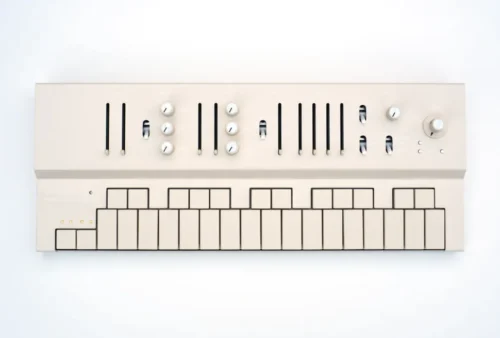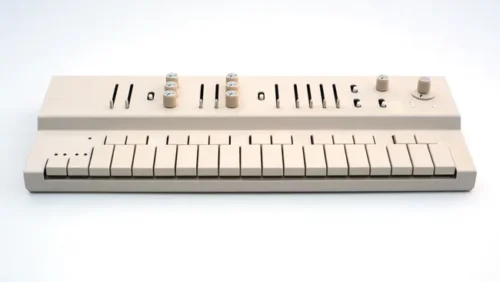Vogon Replay Polyphonic Synthesizer With Multi-Mode Arpeggiator
Vongon, a Californian manufacturer best known for making effects pedals like the Polyphrase and Paragraphs, has announced the release of its first synth.
Replay is a six-voice polyphonic analogue synthesizer and a little window into synth heaven.
Lush pads, tiny plinks, snappy arpeggios, warbling melodies, resonant filters with midi connectivity and a sleek web interface!
Replay is said to be inspired by the Roland Juno and Korg Polysix. The most striking feature of this synth is its minimalist design. Bedecked in a beige aluminium housing with an all-beige keyboard.
Replay is equipped with a six-voice virtual analogue sound engine offering four oscillator waveforms and seven LFO waveforms that Vongon says is capable of producing everything from “rich pads and vibrant leads to snappy arpeggios and deep sub-bass tones”. There’s a multi-mode arpeggiator on board.

The instrument’s 2½-octave keyboard uses Cherry MX keys typically found in mechanical computer keyboards. The top panel hosts a set of 22 controls comprised of a number of Rogan knobs, faders and switches; the synth can also be controlled via a web interface where you can manage presets, access deeper parameter levels and update the firmware.
As for connectivity, you’ll find balanced line-level 1/4″ audio ins and outs along with 3.5mm and USB MIDI.

Features:
- Six-voice virtual analog synthesizer with multi-mode arpeggiator
- Straightforward main panel with additional options available via alt functions or web-based interface
- Single oscillator per voice with ramp, square, sine, and triangle waveforms
- Noise amount control – may be switched to external in via alt functions
- Pulse width modulation with LFO and manual control
- LFO with selectable waveforms and clocking options
- 4-pole low-pass filter with envelope, keyboard, and LFO modulation controls
- VCA with modulation source and level control
- ADSR envelope generator with exponential release
- Multimode arpeggiator: Up/Down, Order, and Random modes
- Arpeggiator range: 1-3 octaves
- Up to 31 preset slots (one per key)
- Cherry MX mechanical keys
- 1/4″ TRS line level output
- 1/4″ TRS line level input
- 5mm TRS MIDI in/out, compatible with type A or B adapters
- USB connectivity for MIDI, connecting to the web interface, or alternative power supply”
Replay sleek and stripped-back design has its charms and it does sound great. Replay is available now price at $899. Find out more on Vongon website.




